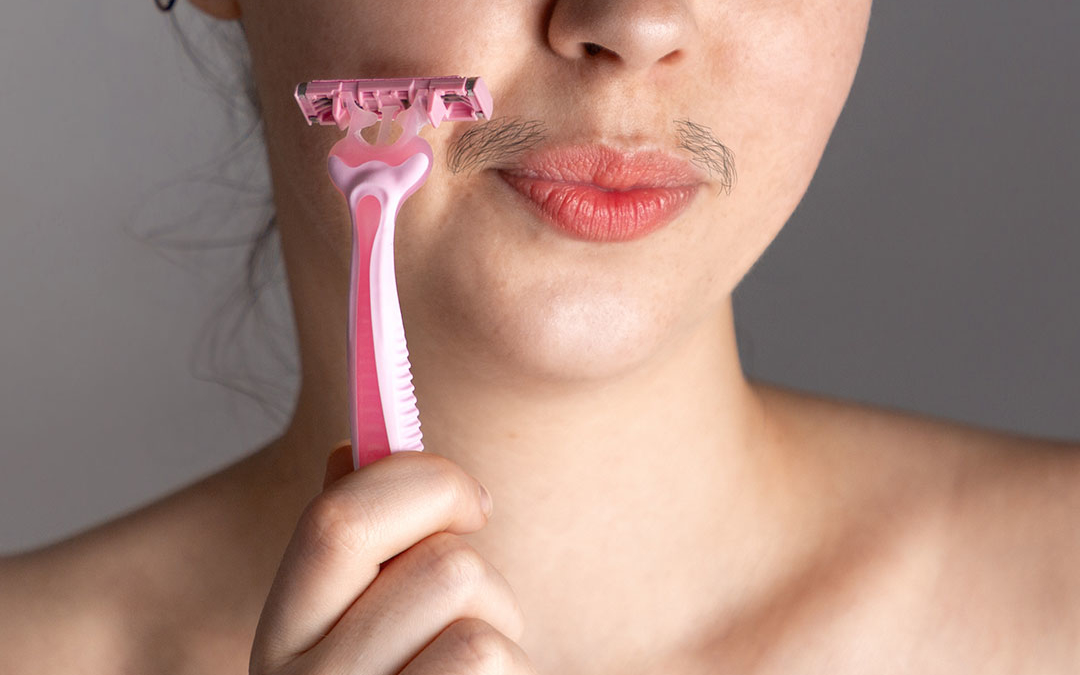Hormones. We can’t live without them – but they can really mess with us, especially when it comes to the way hair grows on our heads, faces and bodies.
In this article we’re going to tell you more about hormones and why they affect face and body hair growth. We’ll look at conditions, usually hormonal, which can cause some women to grow more hair than is usual on their faces, necks, backs and stomachs. This is also known as hirsutism.
What are hormones?
Hormones are chemicals that are released into the bloodstream by specialist cells in the body so that they can send messages to other parts of the body, telling them what to do. They are sometimes called ‘chemical messengers’. There are about 20 major hormones in the human body.
Your blood carries the hormones to different organs and tissues where they are needed to do certain jobs. For example, the growth hormone helps your body develop muscle. Adrenaline makes the heart beat fast during stressful times. It’s known as the ‘fight or flight’ response because in a dangerous situation it gets the body ready to either defend itself or run away.
Insulin controls the level of sugar in the blood. Oestrogen (spelled as estrogen in America) runs the reproductive system in women, controlling periods and fertility.
Which hormones control how we grow hair?
Androgens are the hormones that control how and where we grow hair. As babies and young children we all have fine, downy, almost invisible hairs on our faces and bodies. As we approach our teens, it is the androgen hormones that tell the hair follicles to grow thicker, coloured hair and to start growing it in places where it didn’t grow before; the pubic area, under the arms and on boys’ faces.
Androgens are also responsible when the hair on our scalp thins. Thicker hair becomes thinner and less noticeable and sometimes stops growing all together. Men bear the brunt of this, with some of them going bald. Women can also experience thinning hair as they get older.
One of the best known androgens is testosterone. This is often called the ‘male hormone’. Testosterone causes boys to develop deeper voices and grow beards. But women’s bodies produce testosterone too. Problems start when some women’s bodies produce too much or too little of these hormones.
Hirsutism and Polycystic Ovary Syndrome
Hirsutism, or excessive hair growth, is a distressing condition that can happen to some women. It can cause thick, dark hair to grow on their face, neck, chest, tummy, lower back, buttocks or thighs. This can lead to lack of confidence, anxiety and even depression. In most cases, it happens when there are too many androgens in the blood. In rare cases, hirsutism can be a side-effect of medication or caused by a tumour affecting your hormone levels.
About 70% of women with hirsutism are diagnosed with Polycystic Ovary Syndrome (PCOS). Women with PCOS can often have trouble conceiving. This is because their ovaries aren’t able to release eggs each month ready to be fertilised and start a pregnancy. There are treatments, including surgery, which can improve their chances of having a baby.
As well as fertility problems and excessive facial and body hair, women with PCOS can find it really hard to lose weight and keep it off. They may also suffer from acne. In women’s bodies, testosterone is produced by the ovaries, which is why there is a connection between PCOS and hirsutism.
Hormonal hair growth caused by the menopause
Most women get more hair on their faces as they get older, or at least it seems more obvious, as a result of hormonal changes caused by the menopause. This type of hair growth is not the same as hirsutism.
The menopause happens when a woman’s ovaries stop releasing eggs each month and she stops having periods. This can be the start of an exciting new time of her life, but of course it means there are lots of different messages being sent by hormones to her reproductive system. In all this crazy activity there can be side effects such as mood swings and night sweats. Facial hair is one side effect that a lot of women notice. Sometimes it’s just a few extra, stray, longer hairs or it may be that finer, almost invisible hairs become darker and more noticeable.
Treatments for hirsutism and PCOS
If unusual amounts of thick, dark hair start growing on your face and body you should see your GP who is likely to want to give you a blood test to check your hormone levels and investigate the cause.
If you are overweight, your GP may suggest losing weight, as this can help regulate hormone levels. If it is suitable for you, your GP may also prescribe the contraceptive pill or other medication that can help get your hormones re-balanced.
While any medical investigations go on, most women want to find ways of managing this hair growth. Laser hair removal is one of the most effective ways of getting rid of unwanted hair. Many hair follicles can be permanently damaged in a single session of laser hair removal so that they can never grow a hair again.
Traditional hair removal methods can struggle to deal with hair growth that is caused by a PCOS hormone imbalance. Shaving can mean that stubble grows back again within hours and hair removal creams and waxing only bring temporary relief.
Dealing with unwanted hair
You don’t have to have hirsutism or PCOS to find that your hormones are causing mischief by growing hair you don’t want, or turning ‘peach fuzz’ into something darker and more obvious. Whatever the causes, if it’s an issue you want to solve, we are here for you.
It’s important to remember that we’re all unique and so are our bodies. There isn’t one ‘normal’ way to grow body and facial hair. Our genes, inherited from our parents and grandparents, will have an impact on how fast hair grows and where it grows.
Some women grow hairs on their nipples, lips, chin and tummies. If that’s you, there’s NOTHING to be ashamed of. Don’t think there’s something weird or unusual about you. You’d be AMAZED how many people are dealing with unwanted hair without telling anyone. Whether you choose waxing or laser hair removal or another method is up to you, but we’d love the chance to tell you how we can help at Derby’s Avance Clinic.
Now you know about the role hormones play in hair growth on our faces and bodies, call in to the clinic or ring or email for a confidential chat. We will listen to your worries and our friendly, trained hair removal experts can give you all the information to make the decision that is right for you.

